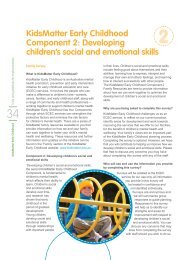Mental health risk and protective factors [436KB] PDF - KidsMatter
Mental health risk and protective factors [436KB] PDF - KidsMatter
Mental health risk and protective factors [436KB] PDF - KidsMatter
You also want an ePaper? Increase the reach of your titles
YUMPU automatically turns print PDFs into web optimized ePapers that Google loves.
Responding to <strong>risk</strong><br />
Since children have different reactions to adversity <strong>and</strong> different ways of coping, it is important to take an individual<br />
approach when assessing whether a child is at <strong>risk</strong> of developing a mental <strong>health</strong> diffi culty. The impacts on the child of<br />
both <strong>risk</strong> <strong>and</strong> <strong>protective</strong> <strong>factors</strong>, including any culturally-specifi c <strong>factors</strong>, should be taken into account when developing<br />
strategies for building resilience.<br />
1 Reduce exposure to <strong>risk</strong><br />
Recognising the kinds of mental <strong>health</strong> <strong>risk</strong> <strong>factors</strong> children are exposed to can help to eliminate or reduce those able<br />
to be addressed. For example, by taking steps to address bullying <strong>and</strong> racism, schools can work to minimise this <strong>risk</strong> for<br />
their students.<br />
Child abuse, neglect <strong>and</strong> exposure to violence represent very serious mental <strong>health</strong> <strong>risk</strong>s for children’s development, <strong>and</strong><br />
frequently cause ongoing trauma <strong>and</strong> disadvantage that extend into adulthood. Action to stop abuse is critical to protect<br />
children’s mental <strong>and</strong> physical <strong>health</strong>. Even when the immediate trauma has stopped, the <strong>risk</strong> of mental <strong>health</strong> diffi culties<br />
remains high for children who have experienced abuse or trauma. When children have been affected by abuse or trauma,<br />
extra effort is required to assist recovery <strong>and</strong> build resilience.<br />
2 Build <strong>protective</strong> <strong>factors</strong> to reduce the effects of <strong>risk</strong><br />
In many situations, it will not be possible for parents, carers or school staff to eliminate the critical <strong>risk</strong> <strong>factors</strong> affecting<br />
children. For example, chronic illness or disability affecting parents or family members are diffi culties that place stress on<br />
children as well as families, particularly because they are chronic, dem<strong>and</strong>ing circumstances <strong>and</strong> are mostly not able to<br />
be solved. In such situations, a focus on identifying <strong>and</strong> building <strong>protective</strong> <strong>factors</strong> can help to reduce the effects of mental<br />
<strong>health</strong> <strong>risk</strong>s.<br />
Ensuring that support is available outside the immediate family (eg extended family, friends <strong>and</strong> school), <strong>and</strong> that children<br />
know how to access it, can be a particularly helpful strategy. Preventive programs designed to assist children to develop<br />
coping skills for their situations can also help to build <strong>protective</strong> <strong>factors</strong>. Examples include programs for children of parents<br />
with a mental illness, siblings of children with special needs, <strong>and</strong> children experiencing loss or family breakdown.<br />
Key points for supporting children who may be affected by<br />
mental <strong>health</strong> <strong>risk</strong> <strong>factors</strong><br />
Build caring relationships<br />
A caring relationship with at least one important adult – ideally a parent or carer – is a signifi cant <strong>protective</strong> factor<br />
that builds resilience to help children cope with diffi culties.<br />
Be aware of <strong>risk</strong>s <strong>and</strong> how your child is coping<br />
Recognising when children are exposed to mental <strong>health</strong> <strong>risk</strong> <strong>factors</strong> <strong>and</strong> observing how well they cope can help you<br />
tune into children <strong>and</strong> provide support to meet their needs.<br />
Establish a support network<br />
Children, parents, carers <strong>and</strong> families cope best when they have support. Support may be available through friends,<br />
extended family, schools, community organisations or professionals. Being able to draw on a network of support is<br />
especially necessary during challenging times.<br />
This resource is part of a range of <strong>KidsMatter</strong> Primary information sheets for families <strong>and</strong> school staff.<br />
View them all online at www.kidsmatter.edu.au<br />
Copyright: © Commonwealth of Australia 2012-13. This work is copyright. You may use this work in accordance with the terms of licence available at www.kidsmatter.edu.au


![Mental health risk and protective factors [436KB] PDF - KidsMatter](https://img.yumpu.com/38050632/4/500x640/mental-health-risk-and-protective-factors-436kb-pdf-kidsmatter.jpg)
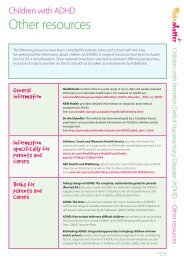
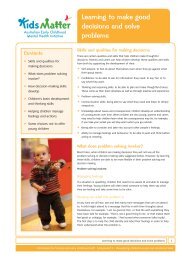
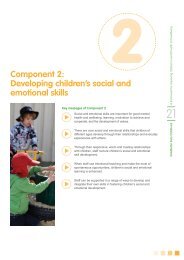


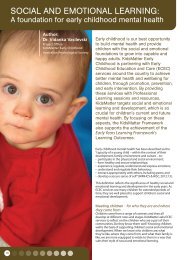


![Trinity Anglican School - Cairns story [378KB]pdf - KidsMatter](https://img.yumpu.com/41716076/1/184x260/trinity-anglican-school-cairns-story-378kbpdf-kidsmatter.jpg?quality=85)
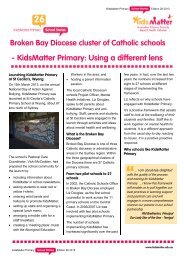
![Happy families work together [327KB] PDF - KidsMatter](https://img.yumpu.com/40767384/1/184x260/happy-families-work-together-327kb-pdf-kidsmatter.jpg?quality=85)
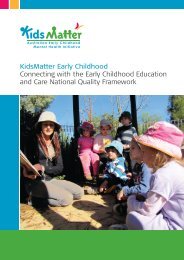
![Action Team Handbook 2012 [1.9M] [PDF] - KidsMatter](https://img.yumpu.com/38050920/1/184x260/action-team-handbook-2012-19m-pdf-kidsmatter.jpg?quality=85)
![[1008KB]pdf - KidsMatter](https://img.yumpu.com/38050895/1/184x260/1008kbpdf-kidsmatter.jpg?quality=85)
